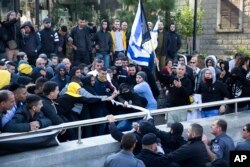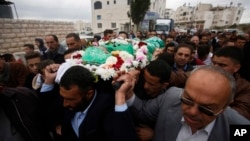An Israeli military court convicted a young soldier of manslaughter Wednesday for shooting and killing a wounded an apparently helpless Palestinian terrorist last year in the West Bank.
The verdict was the culmination of a turbulent series of events that captivated and divided the nation. In a rare move, the army condemned a soldier’s actions during a Palestinian attack; while much of the public was appalled that a young Israeli fighting terrorism in the field was hauled into court like a common criminal.
“The fact that the man on the ground was a terrorist does not justify a disproportionate response,” said Colonel Maya Heller, who delivered the verdict.
On Thursday, police arrested two people on charges of encouraging violent retribution on social media against the three military judges who convicted the soldier. A police spokesman said a man in Jerusalem and a woman in the southern town of Kiryat Gat posted remarks on Facebook that amounted to "incitement to violence" against the judges.
The drama began nine months ago in the West Bank town of Hebron during a wave of attacks that Palestinians had dubbed “The Intifada [Uprising] of the Knives.” A Palestinian had stabbed a soldier and was “neutralized” by Israeli forces, lying immobile on the ground.
Then, a cellphone video caught 19-year-old Sergeant Elor Azaria aiming his assault rifle at the attacker and shooting him in the head. The soldier claimed that he feared the Palestinian was booby-trapped with a bomb, but commanders quickly disputed that, saying the attacker posed no threat and Azaria had violated the army’s code of moral conduct. That account was backed up by the court.
Natanyahu wants pardon
After the verdict, Israeli Prime Minister Benjamin Netanyahu posted a Facebook statement saying he would like to see a pardon for Azaria.
"We have one army that is the basis for our existence," Netanyahu wrote. "IDF soldiers are our sons and daughters, and they must remain above all disputes. I purport granting a pardon to Elor Azaria.”
President Reuven Rivlin is the only one who can make that decision. His office says the president wants the judicial process, including any appeals, to play itself out before he considers a pardon.
Unacceptable action
The ruling “shows that professional commanders and professional judges, although they play different roles ... reached the same conclusion, namely, that this was a most unacceptable action on the part of the soldier,” said professor Asa Kasher, co-author of the Israel Defense Forces Code of Ethics. “It is legally, ethically and morally unacceptable.”
But many Israelis are furious over what they see as a false sense of moral equivalence. They say soldiers are being put on trial in order to protect terrorists.
It’s a serious rift, because traditionally the army has been a strong source of unity in a country with deep political, religious and cultural divisions between left and right, hawks and doves, religious and secular, and European and Middle Eastern Jewry.
“Tomorrow there is no IDF!” a female relative of the Azaria family shouted at the judge before being escorted out of the courtroom. “The IDF is over!”
“This is not something that’s going to be particularly very good for Israel,” said Israel Television commentator Arieh O’Sullivan, noting the trial exposed a deep rift in Israeli society and government. “We had members of the Knesset [parliament] and generals taking both sides; we had a former defense minister and present defense minister taking a [different] side; in fact, we had the prime minister calling up Azaria’s father and offering him support.
“So, we have a situation that touched upon the fissures of Israeli society,” O’Sullivan concluded. “It’s not going to be over with today’s verdict and it’s going to be with us for a long time.”
Rules and values
Kasher, on the other hand, is more optimistic.
“I don’t think it will have a long-range effect on Israeli society or the IDF,” he said. “It’s a special event, it’s a rarity.
Commanders and soldiers know very well what are the rules of engagement, what are the procedures, what are the values of the IDF, which include the purity of arms and the sanctity of human life. ... And the society now sees that all the commanders and the judges reached the same conclusion.”
The verdict even won rare praise from one of Israel’s harshest critics.
“Today’s conviction of a member of the Israeli forces is a rare occurrence in a country with a long record of using excessive and unwarranted force, and where soldiers who may have committed crimes under international law very seldom face prosecution,” said Philip Luther, Research and Advocacy Director for the Middle East and North Africa at Amnesty International. “The verdict is a small step in the right direction and offers a glimmer of hope that soldiers who commit unlawful killings may no longer go unpunished.”
Elor Azaria faces up to 20 years in prison. He will be sentenced at a later date.
Kenneth Schwartz in Washington contributed to this report.






